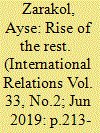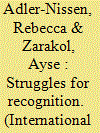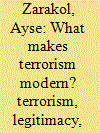|
|
|
Sort Order |
|
|
|
Items / Page
|
|
|
|
|
|
|
| Srl | Item |
| 1 |
ID:
095981


|
|
|
|
|
| Publication |
2010.
|
| Summary/Abstract |
This article joins the growing scholarship on the ontological security needs of states. By focusing on state denial of historical crimes, the article will address the main point of contention among scholars who study ontological security, i.e. the question of whether identity pressures on states are mostly endogenously or exogenously generated. Through a study of the Turkish state's reluctance to apologize for the Armenian genocide, and the Japanese discomfort over the WWII atrocities, I argue that we can avoid tautology in our generalizations by introducing temporal and spatial dimensions to the argument. Inter-subjective pressures matter more at times when traditional routines defining the self are broken and are more likely to create ontological insecurity outside the West. The review of the Turkish and Japanese cases demonstrate that both social and individualistic approaches to ontological security are partly right, but also incomplete because neither takes into account the uneven expansion of international society or the effect this expansion has had on the identity of outsider states who were incorporated into the system at a later date.
|
|
|
|
|
|
|
|
|
|
|
|
|
|
|
|
| 2 |
ID:
119648


|
|
|
|
|
| Publication |
2013.
|
| Summary/Abstract |
This article draws attention to some surprising similarities between the recent political trajectories of Turkey and Thailand in order to argue that international norms strongly shape domestic cleavage formations. The timing and the manner of incorporation of particular states into the international system affects not only their political and economic development, but also the way various domestic groups see their mission, their identity, and their opposition. In both Turkey and Thailand, what development has brought is neither the opposition between traditional status groups and the market generated social forces, nor the tradition/religion-based opposition to modernization and democracy that is typically assumed to mark developing societies. What we find in both cases instead is a modernization-generated statist/bureaucratic social middle class that justifies its skepticism of democratization on the basis of norms upheld by the international society itself.
|
|
|
|
|
|
|
|
|
|
|
|
|
|
|
|
| 3 |
ID:
167193


|
|
|
|
|
| Summary/Abstract |
The past decade has been characterised (among other things) by the emergence of a discourse about the ‘Rise of the Rest’. (Some) non-Western states have been described as ‘rising powers’ capable of agency in the international system and as potential partners for the West in global governance. This stands in contrast to a more traditional narrative that saw the non-West primarily as a source of international problems and a developmental project. Does this discursive shift signify a historic reversal in how the non-West understood by the West? The answer is complicated. In this article, I argue that the hype about ‘rising powers’ in Western policy circles following the Global Financial Crisis of 2007–2008 had little relation to an ‘objective’ analysis of actual structural shifts in favour of ‘the Rest’ and was more akin to a financial bubble, with speculation driving perceptions of ‘rising powers’. I also show that the ‘rising powers’ literature is better located within the broader (and long-standing) debate about the decline of the United States, and should be read more as a manifestation of American anxieties and hopes than as informing us about the choices or the motivations of the ‘rising powers’. Ironically, however, the Western hype nevertheless has helped along a structural shift that is under way, first by partly moulding reality in that direction (especially in the form of financial decisions), but more importantly by freeing non-Western powers (for better or worse) from their internalised cages of perceived inferiority and lack of agency in the modern international order.
|
|
|
|
|
|
|
|
|
|
|
|
|
|
|
|
| 4 |
ID:
178579


|
|
|
|
|
| Summary/Abstract |
The Liberal International Order (LIO) is currently being undermined not only by states such as Russia but also by voters in the West. We argue that both veins of discontent are driven by resentment toward the LIO's status hierarchy, rather than simply by economic grievances. Approaching discontent historically and sociologically, we show that there are two strains of recognition struggles against the LIO: one in the core of the West, driven by populist politicians and their voters, and one on the semiperiphery, fueled by competitively authoritarian governments and their supporters. At this particular moment in history, these struggles are digitally, ideologically, and organizationally interconnected in their criticism of LIO institutions, amplifying each other. The LIO is thus being hollowed out from within at a time when it is also facing some of its greatest external challenges.
|
|
|
|
|
|
|
|
|
|
|
|
|
|
|
|
| 5 |
ID:
108502


|
|
|
|
|
| Publication |
2011.
|
| Summary/Abstract |
This article aims to understand the phenomenon of international terrorism by wedding a constructivist understanding of terrorism with an overview of the historical evolution of the state. The Westphalian state has replaced three types of authority: religious, personal and local. Political challenges to the modern international system inevitably derive their claim to legitimacy from one of these other forms of authority. I argue that there is a correlation between the kind of legitimacy claim a 'terrorist' cause is based on and how threatening we find the activities based on that claim. The less the distance between the unrecognised legitimacy claim on the one hand and the principles conferring legitimacy in the modern states system on the other, the less ontologically threatening we find the claimants to be. All historical variants of modern 'terrorism' fall into one of two categories of disruptive activity. They are either based in claims to local authority and target only particular states, or in claims to personal and/or religious authority and reject the modern states system altogether. Groups labelled as terrorist can therefore be classified as system-affirming or system-threatening. The former is a contained problem, but the latter has followed geographically broadening spread pattern throughout the international system.
|
|
|
|
|
|
|
|
|
|
|
|
|
|
|
|
|
|
|
|
|